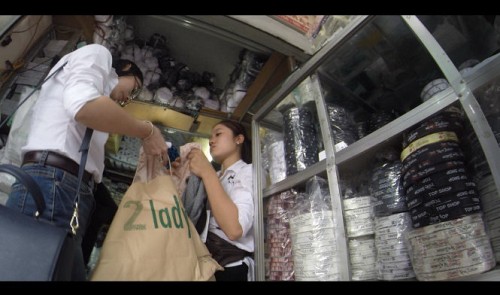The rampancy of fake, faulty clothing and footwear items under the guise of leftover, export-bound brand name products has perplexed unsuspecting buyers in Ho Chi Minh City over recent years.
Dinh Thi Thu Hoa, a resident of Thu Duc District, was astounded at having spotted a replica pair of Zara Basic sandals which she had gone to great lengths to buy through a website based in another country last year.
The lookalike was peddled on the street for a mere VND130,000 (US$6), one-tenth of what hers had cost, including tax and shipment fees.
Hoa bought the pair, advertised as export stock, and found them shockingly similar to her pricey, authentic ones, apart from the level of comfort when wearing them.
Phuc, who lives in District 12, was also frustrated that a pair of N. brand ‘export-bound’ shoes which he had purchased at a large store on Ly Chinh Thang Street in District 3 for nearly VND500,000 ($22) had their soles come off only after two weeks of use.
Nguyen Thanh Long and Thanh, a married couple about to close down their shop trading in these items, revealed it had taken them time to figure out how specific staffers at footwear manufacturing facilities sneak out export-bound products to brokers, who will in turn sell them to shop owners.
According to Long, there are different kinds of export-bound products.
The first are articles produced in surplus to replace defective ones before shipping.
The excess items may be stealthily slipped out to shop owners after the shipments are proven export-worthy and free from fault.
Bulk order makers or parent companies typically stipulate in contracts that the excess batch can only be circulated on the market three to four years after the release of authentic products, with all brand tags removed.
“These excess items are generally of good quality but they have become out of fashion and usually come in limited sizes and colors,” Long added.
The second type is defective items, which have one or a few mistakes in them, but are otherwise of acceptable quality.
The flawed items, which are supposed to be destroyed, are somehow sneaked out.
A third category includes items failing to meet shipping deadlines and rejected by order makers, and those which are not cleared by customs for any other reason, Long further explained.
A veteran trader in export-bound products revealed that many shop owners mix authentic products with fakes, meaning customers are lucky if they pick up the real deal.
Brand tags – an easy thing
In late 2014, Nguyen Ngoc, a teacher in the Mekong Delta province of Hau Giang, purchased export-bound clothes from a packed shop named L. on Dien Bien Phu Street, District 3, before selling them in her hometown.
Despite her incessant enquiries, the shop owner would keep her in the dark about the origin of the goods.
A detective hired by Ngoc later discovered that most of the goods for sale at the shop came from wholesale markets An Dong and Tan Binh in District 5 and Tan Binh District respectively.
Ngoc was surprised by the abundance of copycats and fakes there, which carry renowned brand names but sell for much lower prices.
As observed by Tuoi Tre (Youth) newspaper reporters, rolls of cloth bearing brand names were displayed blatantly at stalls in Tan Binh Market’s garment material section.
Each roll, with 500 tags of various brands including Mango, Zara, Forever 21, H&M, Oasis, Ralph Lauren, Burberry and Levi’s, is readily available for VND50,000 ($2.2), and VND40,000 ($1.7) in bulk orders.
One stall owner was confident that she could satisfy all brand-name label needs, including more technically demanding ones like engraved brand names on buttons and zippers.
She added that her patrons include garment facilities and tailors’ in District 4 and District 8.
Pham Xuan Hong, chair of the Ho Chi Minh City Association of Garment Textile Embroidery and Knitting, said that there are a limited number of defective, surplus or customs-claimed products, particularly of famous brands, available on the market, due to strict terms stipulated by buyers.
Manufacturers who fail to comply with the terms, including circulation of surplus items without all labels removed within two years of the launch of the authentic goods, will have their contracts terminated.
According to a manufacturing supervisor at a major footwear exporter in Dong Nai Province, neighboring Ho Chi Minh City, most of the stocks for shops trading in export-bound items come from China.
These pieces are considered copycats, not fakes, as they are usually churned out using the same materials as originally ordered products, he noted.
























































